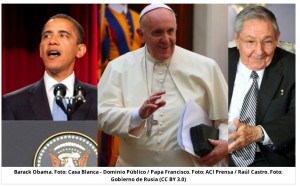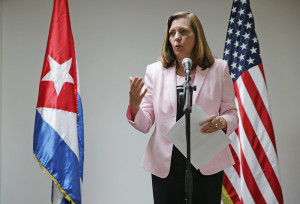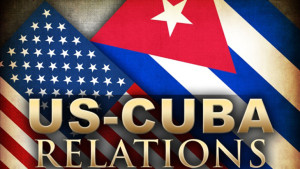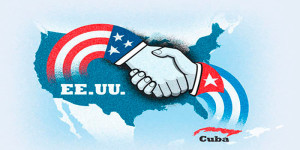CUBA AND U.S. RELATIONS. DIPLOMATICALLY.. “THE REAL TRUTH.”
Under the thaw and normalization of bilateral relations between Cuba and the United States President Barack Obama just announced that it will make an expected visit to Cuba on 21 and 22 March next on a journey that then include a visit to Buenos Aires. His wife Michelle will accompany him on his journey.
It will be the first American president who, in the exercise of its mandate, arrives on the island since, in 1928, Calvin Coolidge did to attend the Sixth Pan American Conference. Harry Truman, at the time, was in Guantánamo, but without meeting with Cuban government officials and Jimmy Carter, which was president of the north country between 1976 and 1980 he visited Cuba in 2002 and 2011, but only as ex President.
In recent months the bilateral relationship between Cuba and the United States has improved. Perhaps less than what many expected. But the march towards a normal relationship after half a century of disagreements is not easy.
However, some of the US regulatory hurdles have been overcome by an attitude of flexibility both in terms of trade and tourism, which has increased by 54%. Others will inevitably remain, since not depend on the actions, nor of the will of the executive branch, but require action from the US Congress as it happens specifically with the lifting of the trade embargo, which Republicans control the legislative-Power not accompany. This and the need for Cuba to enable full compliance of human rights and civil and political liberties, form the two main outstanding issues on the agenda.
But there is a huge change. The doors are now open. And used. Isolation and even automatic antagonism are left behind with slow cadence. They just, for example, to approve regular commercial flights between the US and Cuba. Soon there will be 20 regular flights from the US to Havana and 10 other Cuban cities. And family support remittances from the US to Cuba have increased. Cuba, albeit too slowly, has started walking, in turn, towards more wireless access and broadband. To this is added that an American factory small tractors, Cleber, produce a thousand units per year in the island for independent farmers who still must operate with tractors owned by the state (of anyone then) and cooperatives, which it is far from ideal.
Barack Obama clarified that his visit aims essentially to contribute to “improve the lives of Cubans.” This is to remove them from the relative delay in terms of standard of living, which has plunged the communism.
It does prudently warning everyone that his country “does not intend to impose a change,” making the courageous and independent “blogger” Cuban Yoani Sanchez agrees, noting since 14ymedio.com, “the US president can not change to Cuba” and that “it is better not try, because this national mess is our responsibility.” To which he adds, however, that Obama’s visit will generate “joy and relief” among Cubans, despite being “more symbolic than politics.”
Not the same a handshake abroad seen on television that a personal visit to the island. Particularly if Obama will have the opportunity, as announced, “to meet with members of civil society, business and Cubans from all walks of society”, which specifically includes, as one of his top aides, Ben Rhodes , the dissidents who were sidelined during the recent visit of Pope Francisco to Cuba.
Yoani, however, warns us in the sense that Obama “should seize the opportunity to send a strong and clear message in front of the microphones.” You will have the opportunity to do so, since it is expected that Obama can go directly to the people of Cuba on the occasion of his visit. There will surely point out that it is not trying to validate the status quo, but to help “change the lives, freedoms and economic opportunities” of Cubans happen. And defend, predictably, the full observance of human rights and civil and political liberties, all alike.
As expected in an intensely election year, leaders of US opposition quickly spoke out against the presidential visit to Cuba. Among them, Jeb Bush, Marco Rubio and Ted Cruz, who said, bluntly, that-his way of seeing things, repression in Cuba is not over.
The truth is that, as noted by Josefina Vidal, in the manner of the Cuban Foreign Ministry spokesman, Obama will have the opportunity to “appreciate the Cuban reality”. First hand. Thereby cementing a process of rapprochement between the two nations that should not stop. So, somehow, irreversible. Even before a possible change of governing party in the United States. Looking forward, then, why so far it has not scheduled an interview with Fidel Castro, the ultimate symbol of a past that has frustrated several generations of Cubans, condemning the delay.
On the bilateral agenda between the US Cuba and there are many outstanding issues. Not only is the lifting of the embargo. Guantanamo and cross claims for reparations, made up of one part by US claims for those suffered confiscations in 1960 were estimated at about 2 billion dollars, on the other, by a Cuban request for compensation also appear and the damage allegedly But I derivatives, estimated in 2014 to the United Nations as the order of just over one billion dollars. And we should not forget the issues on the agenda that have to do with freedom and human rights as well as those relating to flow that feeds the emigration of Cubans to the US, which has not stopped. Much to do, then. When the Communist Party of Cuba is preparing to select who will lead from 2018, whose name probably will not be Castro.
Without taking with regard to Obama’s visit to Argentina immediately after passing through Cuba, striking sympathetic and early reference to it in Ben Rhodes, presidential adviser on security of President Barack Obama, who generously he said that our country is a “sign that the future looks bright for the US in the hemisphere.” It is. Perhaps because the unfortunate and absurd trappings confinements itself that, driven by bolivarianos, suffered our region are no longer possible. Argentina has clearly said it wants to be herself. And as such, working closely with the region that certainly belongs. It was time.
The author is a former Ambassador of Argentina to the United Nations.
La Nacion, Arg./ Emilio Cardenas / Internet photos / thecubanhistory.com
THE CUBAN HISTORY / Hollywood.
Arnoldo Varona, Editor.

CUBA HOTY/TODAY: Por las calles de la Habana, arreglos para el recibimiento al presidente de los Estados Unidos.
RELACIONES DE CUBA Y EEUU. DIPLOMATICAMENTE ..”A RAJATABLA”.
En el marco del deshielo y normalización de las relaciones bilaterales entre Cuba y los Estados Unidos el presidente Barack Obama acaba de anunciar que hará una esperada visita a Cuba el 21 y 22 de marzo próximos en un viaje que luego incluirá una visita a Buenos Aires. Su esposa Michelle lo acompañará en su periplo.
Será el primer presidente norteamericano que, en ejercicio de su mandato, llega a la isla desde que, en 1928, Calvin Coolidge lo hiciera para asistir a la Sexta Conferencia Panamericana. Harry Truman, en su momento, estuvo en Guantánamo, pero sin entrevistarse con funcionarios del gobierno cubano y Jimmy Carter -que fuera presidente del país del norte entre 1976 y 1980- visitó a Cuba en el 2002 y en el 2011, aunque sólo como ex presidente.
En los últimos meses la relación bilateral entre Cuba y los Estados Unidos ha mejorado. Quizás menos de lo que muchos esperaban. Pero la marcha hacia una relación normal después de medio siglo de desencuentros no es fácil.
No obstante, algunos de los obstáculos regulatorios norteamericanos han sido superados mediante una actitud de flexibilidad tanto respecto del comercio como del turismo, que se ha incrementado un 54%. Otros subsisten inevitablemente, desde que no dependen del accionar, ni de la voluntad, del Poder Ejecutivo, sino que requieren acción del Congreso de los EE.UU. como sucede concretamente con el levantamiento del embargo comercial que los republicanos -que controlan el Poder Legislativo- no acompañan. Esto y la necesidad de que Cuba posibilite la plena vigencia de los derechos humanos y libertades civiles y políticas, conforman las dos principales cuestiones pendientes en la agenda de trabajo.
Pero hay un cambio enorme. Las puertas ahora están abiertas. Y se usan. El aislamiento y hasta el antagonismo automático van quedando atrás, con cadencia lenta. Se acaban, por ejemplo, de aprobar vuelos comerciales regulares entre los EEUU y Cuba. Pronto habrá 20 vuelos regulares desde los EEUU a La Habana y otros 10 a otras ciudades cubanas. Y las remesas de ayuda familiar desde los EEUU a Cuba se han incrementado. Cuba, aunque demasiado lentamente, ha empezado a caminar -a su vez- en dirección a más accesos inalámbricos y a la banda ancha. A lo que se agrega que una fábrica norteamericana de tractores pequeños, Cleber, producirá mil unidades por año en la isla con destino a los agricultores independientes que todavía hoy deben operar con tractores de propiedad del estado (de nadie entonces) y de cooperativas, lo que está lejos de ser lo ideal.

Barack Obama aclara que su visita apunta esencialmente a contribuir a “mejorar la vida de los cubanos”. Esto es a sacarlos de la postergación relativa, en materia de nivel de vida, en la que el comunismo los ha sumergido.
Lo hace advirtiendo prudentemente a todos que su país “no pretende imponer un cambio”, con lo que la valiente e independiente “bloguera” cubana Yoani Sánchez coincide, acotando desde su 14ymedio.com, que “el mandatario norteamericano no podrá cambiar a Cuba” y que “es mejor que ni lo intente, porque este entuerto nacional es nuestra responsabilidad”. A lo que agrega, sin embargo, que la visita de Obama generará “alegría y alivio” entre los cubanos, pese a ser “más simbólica que política”.
No es lo mismo un apretón de manos en el extranjero visto por televisión que una visita personal a la isla. Particularmente si Obama va a tener la oportunidad, como ha anunciado, “de reunirse con los miembros de la sociedad civil, empresarios y cubanos de todos los ámbitos de la sociedad”, lo que específicamente incluye, según uno de sus principales asesores, Ben Rhodes, a los disidentes que quedaron de lado en la reciente visita del Papa Francisco a Cuba.
Yoani, sin embargo, nos alerta en el sentido de que Obama “debe aprovechar la oportunidad para enviar un mensaje fuerte y claro frente a los micrófonos”. Tendrá la oportunidad de hacerlo, desde que está previsto que Obama pueda dirigirse directamente al pueblo de Cuba en oportunidad de su visita. Allí seguramente señalará que no está intentando convalidar el status quo, sino ayudar a que ocurra “un cambio en las vidas, libertades y posibilidades económicas” de los cubanos. Y defenderá, previsiblemente, la plena vigencia de los derechos humanos y libertades civiles y políticas, de todos por igual.
Como cabía esperar en un año intensamente electoral, los líderes de la oposición norteamericana se pronunciaron rápidamente en contra de la visita presidencial a Cuba. Entre ellos, Jeb Bush, Marco Rubio y Ted Cruz, quienes señalaron, contundentemente, que -a su modo de ver las cosas- en Cuba la represión no ha terminado.
Lo cierto es que, como señalara Josefina Vidal, a la manera de portavoz de la Cancillería cubana, Obama tendrá la oportunidad de “apreciar la realidad cubana”. De primera mano. Cimentando de ese modo un proceso de acercamiento entre las dos naciones que no debe detenerse. Haciéndolo, de alguna manera, irreversible. Aún ante un eventual cambio de partido de gobierno en los Estados Unidos. Mirando hacia adelante, entonces, razón por la cual hasta ahora no se ha previsto una entrevista con Fidel Castro , el símbolo máximo de un pasado que ha frustrado a varias generaciones de cubanos, condenándolos al atraso.
En la agenda bilateral entre los EE.UU. y Cuba hay muchas cuestiones pendientes. No sólo el levantamiento del embargo. También aparecen Guantánamo y los reclamos cruzados de reparaciones, conformados por una parte por los reclamos norteamericanos por las confiscaciones sufridas, que en 1960 se estimaron en unos 2 billones de dólares y, por la otra, por un pedido cubano de compensación por los daños pretendidamente derivados del embargo, estimado en el 2014 ante las Naciones Unidas como del orden de algo más de un billón de dólares. Y no cabe olvidar los temas de la agenda que tienen que ver con la libertad y los derechos humanos, así como los referidos al flujo que alimenta la emigración de cubanos a los EEUU, que no se ha detenido. Mucho que hacer, entonces. Cuando el Partido Comunista de Cuba se apresta a seleccionar a quien lo conducirá desde el 2018, cuyo apellido seguramente no será Castro.
Sin entrar de lleno en lo referido a la visita de Obama a la Argentina inmediatamente después de su paso por Cuba, llama la atención la simpática y temprana referencia a ella de Ben Rhodes, asesor presidencial en materia de seguridad del presidente Barack Obama, quien generosamente señaló que nuestro país es un “indicio de que el futuro se muestra brillante para los EE.UU. en el hemisferio”. Es así. Quizás porque que los lamentables arreos y los absurdos encierros en sí misma que, impulsada por bolivarianos, sufriera nuestra región ya no son posibles. La Argentina ha dicho claramente que quiere volver a ser ella misma. Y, como tal, trabajar intensamente con la región a la que ciertamente pertenece. Era hora.
El autor es ex Embajador de la República Argentina ante las Naciones Unidas.
La Nacion, Arg./ Emilio Cardenas/Internet photos/thecubanhistory.com
THE CUBAN HISTORY/ HOLLYWOOD.
Arnoldo Varona, Editor.







